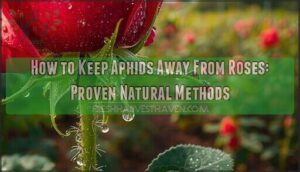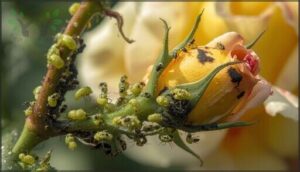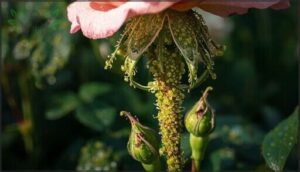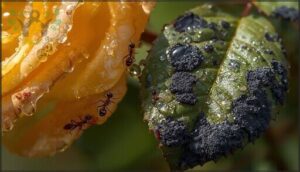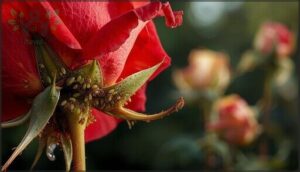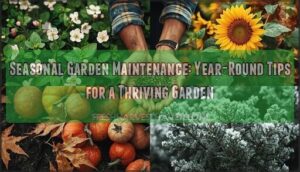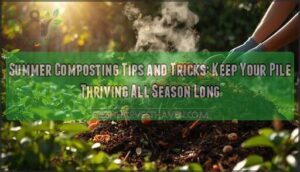This site is supported by our readers. We may earn a commission, at no cost to you, if you purchase through links.
A single rose aphid can produce up to 80 offspring in just one week—without mating. This explosive reproductive rate explains why your healthy rose bush can suddenly become covered in sticky, deformed leaves seemingly overnight.
These tiny pests don’t just damage the appearance of your roses; they weaken the entire plant by draining nutrients from new growth, leaving your bushes vulnerable to disease and unable to produce the vibrant blooms you’ve worked so hard to cultivate.
Fortunately, keeping aphids away from roses doesn’t require harsh chemicals or complex interventions. By understanding where these insects hide, recognizing the early warning signs, and implementing a few strategic natural controls, you can protect your roses throughout the growing season while maintaining a healthy garden ecosystem.
Table Of Contents
Key Takeaways
- A single rose aphid can produce 80 offspring in just one week without mating, which explains how infestations appear seemingly overnight and makes weekly inspections during the growing season—especially from May through June—essential for early detection and control.
- Aphids cause serious long-term damage by draining nutrients from new growth, reducing flower production by 20-40%, spreading over 30 plant viruses, and weakening your roses’ defenses against secondary pests and diseases like sooty mold and bacterial rot.
- Natural control methods like water sprays, insecticidal soap, neem oil, and companion planting with aromatic herbs (rosemary and lavender cut populations by 60%) work effectively without harming beneficial insects or your garden ecosystem.
- Creating a self-regulating garden ecosystem through strategic companion planting, attracting beneficial insects like ladybugs (which consume up to 5,000 aphids in their lifetime), and choosing resistant rose varieties reduces aphid pressure by up to 80% without harsh chemicals.
Identifying Aphid Infestations on Roses
Spotting aphids early can save your roses from serious damage. These tiny pests leave behind telltale clues that you can learn to recognize with a quick inspection.
Let’s look at the key signs that aphids have moved in on your rose bushes.
Common Signs of Aphid Damage
Twisted leaves and sticky stems don’t lie—your roses are under siege. Aphid damage signs show up fast once these pests settle in. Watch for:
- Leaf deformity: curled, puckered foliage appears when populations exceed 50 aphids per stem
- Honeydew effects: sticky coating on leaves and stems
- Sooty mold impact: black fungal growth blocking light
- Deformed buds: up to 60% fail to open
- Plant stress response: yellowing and stunted growth
Early detection gives you control. Regular use of natural pest control methods can help mitigate aphid infestations.
Where Aphids Hide on Rose Plants
Knowing where to look for aphid infestations on your rose bushes starts with checking the right spots. Up to 90% cluster on tender new shoots during peak season, with populations hitting 8.3 aphids per bud before flowering. Don’t just scan the obvious—leaf undersides shelter up to 70% at midday, and dense inner foliage conceals another 25–35%. Understanding the role of phytohormone metabolism is essential in developing strategies to combat aphid infestations.
Here’s your search map:
| Location | Peak Density | Why They Hide There |
|---|---|---|
| Leaf Undersides | 70% at midday | Protection from sun, predators |
| New Shoots & Rose Buds | 8.3 per bud | Nutrient-rich, easy sap access |
| Dense Inner Foliage | 25–35% hidden | Wind, spray shelter |
Bud colonies form rapidly where cells puncture easily. Stem infestations appear on green tissue during shoot elongation, with petiole settlement timing leaf expansion. Check these zones weekly for early aphid control.
Recognizing Honeydew and Sooty Mold
Once you’ve found the aphids, look for their telltale calling cards. Honeydew signs appear as clear, sticky residue coating leaves—often glossy under sunlight.
Within a week, sooty mold follows, leaving black spots and powdery patches where honeydew accumulated. This dual symptom is your strongest aphid detection tool.
Ants swarming rose bushes? They’re feeding on that sticky residue, confirming aphid infestation even before visible damage appears.
Why Aphids Are Harmful to Roses
Aphids don’t just look unsightly on your roses—they cause real damage that weakens your plants over time. These tiny pests affect everything from daily growth to long-term plant health, and they often bring additional problems along with them.
Understanding exactly how aphids harm your roses will help you recognize why quick action matters.
Impact on Rose Health and Growth
Aphid stress hits your roses harder than you might think, triggering a cascade of problems that go far beyond a few nibbled leaves. When these tiny pests siphon plant hormones and nutrients, they disrupt normal growth patterns and leave behind tissue damage that compromises rose bush health. Here’s what happens:
- Your roses lose 18–32% of their annual growth potential due to aphid infestation
- Flower production drops by 20–40%, with buds that fail to open properly
- Photosynthesis plummets by 25% as damaged leaves can’t capture sunlight effectively
Rose garden maintenance and early aphid control protect your plants’ vigor and beauty.
Diseases and Secondary Pests Attracted by Aphids
The fallout from aphid infestations goes well beyond weakened stems. Virus transmission accelerates—aphids spread over 30 distinct plant viruses, causing yield losses up to 40%. Honeydew fuels sooty mold, slashing photosynthesis by 30–60%.
Meanwhile, fungal infections like botrytis surge 2.5 times higher, while bacterial rot climbs 20–30%. Aphid damage also invites whiteflies, spider mites, and thrips, compounding your rose troubles.
Long-Term Effects of Infestations
Chronic damage from aphid infestations reshapes your garden’s future. Persistent feeding triggers plant stress responses and genetic adaptation mechanisms that alter rose physiology for seasons ahead. Managing aphid infestations early protects your investment.
- Reduced flower yield: Expect up to 40% fewer blooms as transcriptomic changes redirect resources from flowers to defense.
- Chronic disease risk: Weakened defenses invite pathogens year-round, particularly in greenhouses.
- Soil degradation effects: Nutrient depletion accelerates, demanding increased fertilization.
Preventing aphid infestations now secures your long-term aphid-free garden.
Preventing Aphids on Rose Bushes
The best defense against aphids is stopping them before they arrive. You can protect your roses through smart planning and consistent care rather than waiting until an infestation takes hold.
Let’s look at the practical steps you can take to keep your rose bushes naturally aphid-free.
Choosing Resistant Rose Varieties
Not all roses are created equal in terms of fighting off aphids. Some rose bushes, like Harmonie, Louise Odier, and Superstar, show impressive genetic resistance thanks to breeding programs that prioritize plant resistance.
These cultivars can reduce pest pressure by up to 80%, supporting organic rose care and sustainable cultivation. Selecting resistant varieties is your first line of defense in effective aphid control methods.
Regular Monitoring and Early Detection
Think of early detection as your secret weapon against aphid invasions. Weekly visual inspection during spring and autumn—peak aphid seasons—can slash outbreaks by 40%. Focus on new growth where 70% of aphids first appear, and watch for sticky leaves or wandering ants as early warning signs.
These detection methods reduce the need for chemical interventions by 35%, keeping your preventive measures simple and effective.
Creating a Supportive Garden Ecosystem
A thriving garden ecosystem is your strongest defense against aphids. Healthy soil microbes and organic gardening practices strengthen plants naturally, while beneficial insects patrol for pests.
When you build biodiversity with mixed plantings, your roses benefit from 50% fewer outbreaks compared to single-variety beds.
This ecosystem balance means natural pest control methods work harder—reducing aphid attacks without chemicals.
Companion Planting to Deter Aphids
Certain plants act as living shields, making your roses less appealing to aphids while inviting helpful predators to patrol.
Aromatic Herbs and Flowering Companions work through powerful Repellent Mechanisms:
- Rosemary and lavender near roses cut aphid populations by over 60% in controlled trials
- Marigolds and nasturtiums reduced visible infestations by 34–41% through Diversified Planting
- These Biological Enhancers boost ladybug sightings by 28%, perfecting Natural Pest Control Methods for Attracting Beneficial Insects around Aphids on Roses
Strategic Companion Planting for Pest Control transforms your garden into a self-defending ecosystem.
Natural and Organic Aphid Control Methods
Once you’ve spotted aphids on your roses, it’s time to take action with methods that won’t harm your garden’s natural balance. The good news is that you don’t need harsh chemicals to reclaim your blooms.
Here are four proven organic approaches that work with nature, not against it.
Manual Removal and Water Sprays
You can knock aphids off your roses with a focused jet from your garden hose—it’s that simple. This manual removal method dislodges over 90% of visible pests on contact.
For best results, spray daily for three consecutive days, adjusting your hose nozzle to medium pressure. Regular watering won’t work; you need a strong, targeted stream to disrupt their sap-feeding.
DIY Soap and Neem Oil Sprays
Water alone won’t always do the job, so homemade sprays deliver targeted control. Mix 5 tablespoons of dish soap per gallon of water, or use 2 tablespoons of neem oil for gentler action. Apply your insecticidal soap spray thoroughly, especially on leaf undersides where aphids hide.
- Reapply every 4–7 days for consistent aphid resistance management
- Test on a few leaves first to prevent damage on sensitive varieties
- Spray during early morning or late evening to protect pollinators
- Combine both soap spray and neem oil benefits for severe infestations
- Expect up to 90% mortality with direct contact using proper soap spray efficacy techniques
These natural gardening methods support effective natural pest control without harsh chemicals.
Attracting Beneficial Insects
Your garden already holds the ideal aphid solution: ladybugs, lacewings, and hoverflies. These natural predators devour hundreds of aphids weekly—lady beetles alone can consume up to 5,000 during their lifespan.
Plant dill, fennel, yarrow, and buckwheat near your roses to triple beneficial insect populations.
This biological control approach creates an eco-friendly defense system, with predator attraction delivering lasting results without harsh chemicals.
Using Trap Plants for Aphid Diversion
Beyond attracting beneficial insects, trap plants actively lure aphids away from your roses. Position marigolds, eggplants, or bush beans around your rose garden’s perimeter—these attractive crop rotation choices can reduce aphid pressure by up to 75%.
Strategic trap plant selection works best when:
- You allocate 5–20% of your garden space to these aphid magnets
- You combine two species, like sunflowers and nasturtiums, extending protection by 30%
- You pair trap plants with companion planting techniques for integrated pest management
This natural remedy creates a physical barrier while your aphid predators flourish.
Advanced and Eco-Friendly Aphid Management
Once you’ve mastered the basics of aphid control, you can take your rose protection to the next level with pioneering strategies backed by research. These progressive methods offer powerful alternatives to conventional pesticides while supporting a thriving garden ecosystem.
Let’s explore three modern approaches that will help you maintain beautiful, aphid-free roses for years to come.
Innovative Biological Controls and Plant Extracts
If you’re ready to move beyond insecticidal soap and basic natural remedies, sophisticated biological controls can transform your organic gardening approach. These beneficial insects and biopesticide formulations work with your garden ecosystem, targeting aphids on roses while protecting pollinators and soil health.
Entomopathogenic fungi like Metarhizium anisopliae achieve over 60% aphid mortality within a week, while parasitic wasps reduce populations by 33% at peak infestation. Plant extracts from marigold (Tagetes erecta) and wormwood (Artemisia) offer powerful botanical insecticides, with some biopesticide formulations matching synthetic standards without environmental harm.
| Control Method | Active Agent | Efficacy Rate |
|---|---|---|
| Entomopathogenic Fungi | Metarhizium anisopliae | 60%+ mortality (7 days) |
| Plant Extracts | Marigold (T. erecta) | 66.3% mortality |
| Parasitic Wasps | Aphidius matricariae | 33.4% reduction at peak |
| Neem Biopesticides | Azadirachtin | 46–53% control |
Avoiding Harmful Chemical Insecticides
You’ve probably heard that chemical insecticides promise quick aphid control, but here’s what you won’t hear advertised: 35 pesticides still used on US ornamental plants remain banned in Europe due to ecological toxicity.
Chemical insecticides may work fast, but 35 used in the US are banned in Europe for harming ecosystems
These chemicals contaminate waterways, reduce beneficial insect emergence by over 30%, and harm pollinators.
Organic gardening tips prioritize natural pest control—insecticidal soap, neem oil, and eco-friendly alternatives protect your roses without disrupting garden ecosystems or encouraging aphid resistance.
Long-Term Strategies for Aphid-Free Roses
Consistently implementing biological controls and eco-friendly methods creates a long-term aphid-free garden that thrives season after season. Sustainable gardening techniques—weekly monitoring, organic gardening techniques, and pest management strategies using natural remedies for roses—build aphid resistance in rose cultivation.
When you rotate trap plants and maintain biodiversity, you’re not just controlling aphids on roses; you’re establishing a self-regulating ecosystem that protects your blooms naturally.
Frequently Asked Questions (FAQs)
How often should I inspect my roses for aphids?
Inspect your roses weekly during the growing season, especially from April through July. Increase to twice per week during warm, wet weather when aphid populations surge rapidly. Early detection makes pest management far more effective.
Can aphids return after being completely removed?
Even after complete removal, aphids return—that’s the nature of pest management strategies. Aphid reinfestation happens through migration, eggs, and environmental factors.
Consistent biological controls and monitoring create long-term aphid-free gardens on roses.
Do aphids affect all rose colors equally?
Aphid infestations affect roses of all colors equally—research shows no correlation between bloom color and susceptibility.
Instead, aphid resistance depends on cultivar differences, rose genetics, and specific defense mechanisms within different rose bushes.
What time of year are aphid infestations worst?
Spring infestations peak from May to June when the aphid lifecycle accelerates and seasonal aphid peaks occur.
Controlling aphids on roses requires vigilance during these months, as climate factors and regional variations influence the timing of aphid infestations on roses.
Can indoor roses get aphid infestations too?
Unfortunately, yes—your indoor roses aren’t safe and sound from aphids. Greenhouse conditions like warmth and humidity create year-round havens for aphid infestations, requiring vigilant indoor pest management and greenhouse sanitation to protect your roses from these persistent pests.
Conclusion
Think of keeping aphids away from roses as maintaining a well-balanced defense system—one that grows stronger with each season. By monitoring your bushes regularly, inviting beneficial insects into your garden, and acting quickly at the first sign of trouble, you’ll create an environment where aphids struggle to establish themselves.
Your roses will reward your vigilance with vigorous growth, disease resistance, and the stunning blooms that make every effort worthwhile.
- https://www.sciencedirect.com/science/article/pii/S1018364722004876
- https://pmc.ncbi.nlm.nih.gov/articles/PMC3274740/
- https://www.lovingitgreen.com/natural-ways-to-control-aphids-on-roses/
- https://ipm.ucanr.edu/pdf/pestnotes/pnrosesinsect.pdf
- https://www.academia.edu/83290114/Seasonal_abundance_of_rose_pests_in_relation_to_weather_parameters

